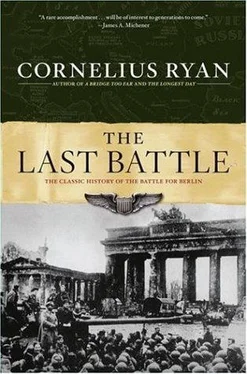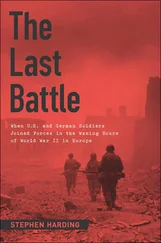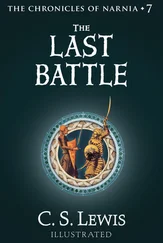At his conference on January 27, 1945, Hitler asked Goering and Jodl: “Do you think that deep down inside, the English are enthusiastic over all the Russian developments?” Jodl answered without hesitation. “Certainly not,” he replied. “Their plans were quite different… later… the full realization will come.” Goering was also confident. “They certainly didn’t plan that we hold them off while the Russians conquer all of Germany,” he said. “They had not counted on us… holding them off in the West like madmen, while the Russians drive deeper and deeper into Germany.” Jodl fully agreed, pointing out that the British “have always regarded the Russians with suspicion.” Goering was so certain that the British would attempt some sort of compromise with the Reich, rather than see the heart of Europe fall into the Communist orbit, that he said: “If this goes on we will get a telegram [from the British] in a few days.”
There may be some slight variations between this translation and the original document. When Eclipse was captured, it was translated into German and then photographed. The version given above is a translation of the captured document back into English.
At Jodl’s trial in Nuremberg in 1946, he was asked why he had not advised Hitler to capitulate early in 1945. Jodl said: “The reasons against it were primarily… unconditional surrender… and even if we had any doubt as to what faced us, it was completely removed by the fact that we captured the English Eclipse.” At this point in his testimony, Jodl looked at the British officers present and said with a half-smile, “The gentlemen of the British delegation will know what that is.” The fact is that the remark was lost on the Britishers at the trial: Eclipse had been kept so secret that they knew nothing about it. It was this mysterious reference, plus several interviews with Frau Jodl, that led the author to Operation Eclipse and its contents, revealed here for the first time.
As originally conceived in 1943 there were actually three parts to Operation Rankin: Case A dealt with a situation in which the Germans might become so weak that only a “miniature Overlord” invasion might be necessary; Case B conceived a strategic German withdrawal from some parts of the occupied countries while still leaving the bulk of their forces along the European coastline to repel an invasion; and Case C dealt with a sudden German collapse either before, during or after the actual invasion itself. Cases A and B were early abandoned and received, as Morgan recalls, only the briefest consideration.
Stalin’s proposals reached Churchill while he was crossing the Atlantic aboard the battleship H.M.S. Duke of York en route to meet with Roosevelt. The U.S. had just entered the war and Churchill had qualms about raising the matter with his powerful new ally at this time. He wired Eden: “Naturally you will not be rough with Stalin. We are bound to U.S. not to enter into secret and special pacts. To approach President Roosevelt with these proposals would be to court a blank refusal and might cause lasting trouble…. Even to raise them informally… would in my opinion be inexpedient.” The State Department was informed of Eden’s conversation with Stalin, but there is no evidence that anyone ever bothered to tell the President of the United States at the time. But by March of 1943 Roosevelt was fully apprised and according to Eden, who discussed the matter with him, the President foresaw no great difficulties with the Soviet Union. “The big question which rightly dominated Roosevelt’s mind,” said Eden, “was whether it was possible to work with Russia now and after the war.”
The account of the events aboard the Iowa comes from handwritten minutes which were made by General George C. Marshall. The actual memorandum contains no direct quotes, only notes made as points of reference. I have directly quoted the President and others where it was clearly indicated that a sentence was being attributed to them.
“The British have had a long economic affiliation with the northern zone,” McCloy wrote General Marshall on December 12, “and Winant tells me that the plan was brought out after consultation with their political and economic people. I do not know to what extent the President wishes to adhere to the occupation of these areas in the face of heavy English opposition…. On the whole I would favor the northern area, but I do not think it is worth the big fight.” The State Department apparently did not care one way or the other. In his own handwriting, McCloy added that Cordell Hull had called and said “he had no preference as between the northern and southern areas.”
One of the great myths that has developed since the end of World War II is that Roosevelt was responsible for the zones of occupation. The fact is that the plan was British throughout. It was conceived by Anthony Eden, developed by the Attlee Committee (which used Morgan’s strictly military concept as the vehicle), approved by Churchill and his cabinet, and presented by Strang at the EAC. Many U.S. and British accounts refer to the zonal division as a Russian plan. This erroneous conclusion derives from the fact that when Gusev, at the second meeting of the EAC, accepted the British proposal, he also submitted a Soviet draft covering surrender terms for Germany. One section dealt with the zones: it was the British plan in toto .
What transpired between Roosevelt and Winant at their meeting, or what the President’s position was on the Berlin transit question is not known. There is further confusion as to whether the War Department did or did not oppose Winant’s “corridor” plan. Major General John H. Hildring, Chief of the Civil Affairs Division, is reported to have told Winant that “access to Berlin should be provided for.” The version here reflects the views of the three principal U.S. historians on this period: Professor Philip Mosely ( The Kremlin and World Politics ); Herbert Feis ( Churchill Roosevelt Stalin ); and William M. Franklin, Director of the State Department’s Historical Office ( Zonal Boundaries and Access to Berlin—World Politics , October 1963). “Winant,” Franklin writes, “apparently made no memoranda of these conversations…. This much, however, is clear: Winant received neither instructions nor encouragement from anyone in Washington to take the matter up with the Russians.”
For reasons which would always remain obscure, Winant’s position on access to Berlin had changed after his return from Washington. Veteran diplomat Robert Murphy recalls that soon after joining Supreme Headquarters in September, 1944, he lunched with Winant in London and discussed the Berlin transit question. Murphy urged Winant to reopen the matter. In his memoirs, Diplomat Among Warriors , he writes: “Winant argued that our right of free access to Berlin was implicit in our right to be there. The Russians… were inclined to suspect our motives anyway and if we insisted on this technicality we would intensify their distrust.” According to Murphy, Winant was not willing to force the issue in the EAC.
At the Conference, another controversial issue boiled up when the President and the U.S. Secretary of the Treasury, Henry Morgenthau, introduced a severe and far-reaching economic plan calling for Germany to be turned into an agricultural nation, without industry. At first Churchill subscribed to this scheme, but under pressure from his advisors later retreated from his original position. Months later Roosevelt abandoned the controversial Morgenthau plan.
Читать дальше












